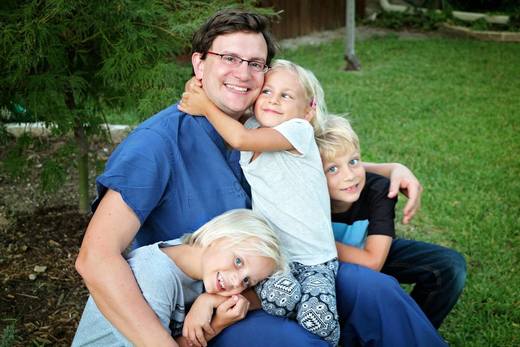Dr James Seaward

Dr. James Seaward says he was drawn to the practice of pediatric plastic surgery because of its potential to impact a child’s life in a way that could change it dramatically for the better.
“Repairing a cleft lip completely changes the psychosocial interactions that child will experience throughout their lifetime,” says Dr. Seaward. “And repairing a cleft palate gives the child the ability to speak and be understood.”
Dr. Seaward is a pediatric plastic and cleft surgeon and an assistant professor of pediatric plastic and craniofacial surgery at UT Southwestern Medical Center. His clinical practice is exclusively pediatric and includes general pediatric plastic surgery, cleft lip and palate surgery, and craniofacial surgery – including minimally invasive techniques, vascular anomalies and trauma reconstruction.
“There are too many surgeons who do both adult and pediatric surgery, treating a small number of pediatric plastic and craniofacial patients outside of a formal team setting with no objective evaluation of the level of care they are providing,” he explains.
Dr. Seaward says he is most inspired by how well many of his patients cope with the obvious differences they have. His most challenging cases are children who have suffered life-changing injuries.
He believes the future of pediatric plastic surgery will see an increase in limited-access techniques for craniofacial surgery, computer-aided customization of devices and procedures, and an increase in objective outcome measurements for craniofacial and cleft surgery.
Before starting at Children’s in 2013, he went to Ghana with Operation Smile – an international children’s medical charity that provides free surgeries to repair cleft lip, cleft palate and other facial deformities for children around the globe.
“I enjoyed that work because it was a chance to dramatically transform the lives of children who would otherwise face a lifetime of stigmatization,” says Dr. Seaward.
Originally from London, Dr. Seaward graduated with honors from Trinity College, Cambridge. He attended the Royal Free and University College Medical School, graduating in 2000, and completed his residency in the United Kingdom. Dr. Seaward then came to Dallas for fellowship training in pediatric plastic and craniofacial surgery at UT Southwestern. He is a Fellow of the Royal College of Surgeons of England, is board-certified in plastic surgery in the United Kingdom and is an active member of the American Cleft Palate – Craniofacial Association.
His current research includes:
Outside of his practice, Dr. Seaward can be found spending time with his wife and four children; playing the piano, violin or trombone; sailing; or taking photographs. He is also an instructor-level skier and a Professional Association of Diving Instructors rescue scuba diver, and he holds a private pilot’s license.
“Repairing a cleft lip completely changes the psychosocial interactions that child will experience throughout their lifetime,” says Dr. Seaward. “And repairing a cleft palate gives the child the ability to speak and be understood.”
Dr. Seaward is a pediatric plastic and cleft surgeon and an assistant professor of pediatric plastic and craniofacial surgery at UT Southwestern Medical Center. His clinical practice is exclusively pediatric and includes general pediatric plastic surgery, cleft lip and palate surgery, and craniofacial surgery – including minimally invasive techniques, vascular anomalies and trauma reconstruction.
“There are too many surgeons who do both adult and pediatric surgery, treating a small number of pediatric plastic and craniofacial patients outside of a formal team setting with no objective evaluation of the level of care they are providing,” he explains.
Dr. Seaward says he is most inspired by how well many of his patients cope with the obvious differences they have. His most challenging cases are children who have suffered life-changing injuries.
He believes the future of pediatric plastic surgery will see an increase in limited-access techniques for craniofacial surgery, computer-aided customization of devices and procedures, and an increase in objective outcome measurements for craniofacial and cleft surgery.
Before starting at Children’s in 2013, he went to Ghana with Operation Smile – an international children’s medical charity that provides free surgeries to repair cleft lip, cleft palate and other facial deformities for children around the globe.
“I enjoyed that work because it was a chance to dramatically transform the lives of children who would otherwise face a lifetime of stigmatization,” says Dr. Seaward.
Originally from London, Dr. Seaward graduated with honors from Trinity College, Cambridge. He attended the Royal Free and University College Medical School, graduating in 2000, and completed his residency in the United Kingdom. Dr. Seaward then came to Dallas for fellowship training in pediatric plastic and craniofacial surgery at UT Southwestern. He is a Fellow of the Royal College of Surgeons of England, is board-certified in plastic surgery in the United Kingdom and is an active member of the American Cleft Palate – Craniofacial Association.
His current research includes:
- Developing an automated evaluator of cleft speech based on a computer-learning system
- Exploring the applications of 3-D video photography to evaluate dynamic facial asymmetry following cleft lip repair
- Expanding applications of magnetic resonance imaging (MRI) for cleft-related speech disorders
- Exploring computer-aided design and manufacturing in craniofacial surgery
Outside of his practice, Dr. Seaward can be found spending time with his wife and four children; playing the piano, violin or trombone; sailing; or taking photographs. He is also an instructor-level skier and a Professional Association of Diving Instructors rescue scuba diver, and he holds a private pilot’s license.
